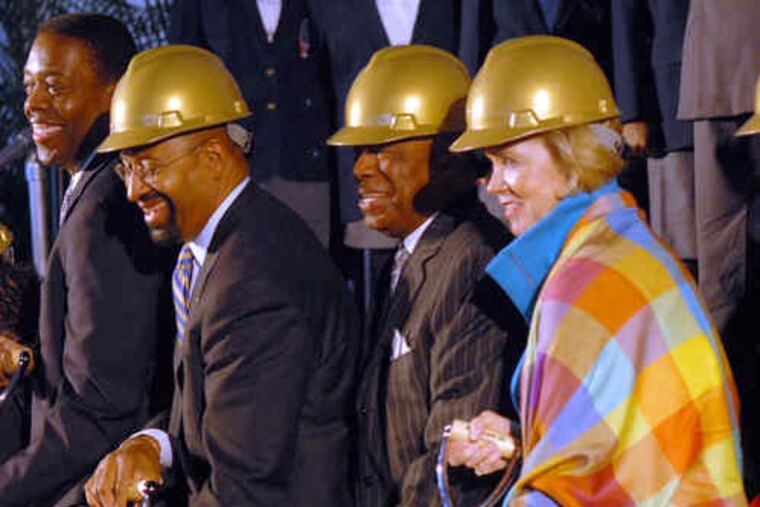Verbatim 'Their primary interest was the preservation and protection of the collection . . .'
Comments by board chairman Bernard C. Watson at the Nov. 13 groundbreaking for the new, $150 million Barnes Museum on the Benjamin Franklin Parkway.

Comments by board chairman Bernard C. Watson at the Nov. 13 groundbreaking for the new, $150 million Barnes Museum on the Benjamin Franklin Parkway.
When I joined the Board of Trustees of the Barnes Foundation in 1999, the foundation's finances were in shambles. The final decade of the 20th century had seen the foundation incurring annual deficits and depleted financial resources, resulting, in large part, from an endless series of expensive and acrimonious lawsuits, going back as early as the 1950s. The foundation's ability to prosper, or indeed survive, in its Merion location was exacerbated by local regulations limiting visitation to the galleries.
Accordingly, in 2000, the board commissioned Deloitte & Touche to develop a long-range plan, which would enable us to restore the foundation to financial health within its Merion setting. By late 2001, however, it was becoming increasingly clear to the board that these efforts were not succeeding. Philanthropists and foundations were simply not giving money to an organization that had a legacy of expensive and distracting litigation, no credible business plan, or a governance structure that would make implementation of such a plan possible. None of the people who continue to raise their voices in angry objection to moving the collection to the Parkway reached into their pockets to support us in any meaningful way in Merion.
I informally approached the Pew, Lenfest, and Annenberg Foundations, all distinguished Philadelphia area institutions, regarding a possible plan to move the collection to Philadelphia. Indeed, such a plan was, in fact, anticipated by Section 11 of the Barnes Foundation Indenture. Section 11 is never raised or addressed by opponents of the move to the Parkway since it is easier to assert a conspiracy than to comprehend a complex reality. The relevant part of the section reads as follows:
". . . should it for any other reason become impossible to administer the trust hereby created concerning said collection of pictures, then the property and funds contributed by Donor to Donee shall be applied to an object as nearly within the scope herein indicated and laid down as shall be possible, such application to be in connection with an existing and organized institution then in being and functioning in Philadelphia, Pennsylvania, or its suburbs."
The heads of these three foundations - Rebecca Rimel, Gerry Lenfest, and Leonore Annenberg - agreed with me that the foundation could not accomplish its mission and fulfill the vision of Dr. [Albert] Barnes by remaining in its Merion location. For five months the board then carefully considered whether there were any alternatives that were less dramatic and still consistent with their fiduciary obligations to pursue a course in the best interest of the foundation. To this end, the board again drew on the expertise of Deloitte, which concluded in the late summer of 2002 that the restrictions placed on the foundation's besieged suburban setting had simply become an insurmountable obstacle to fund-raising.
The board was determined to succeed independently - not as a part of another institution, or in partnership with one. The Pew, Lenfest, and Annenberg Foundations were committed to our continued independence and had no interest in controlling the board or the foundation. They acted in the public interest, not only to save the Barnes from financial collapse, but also to put it on a sound, long-term footing as an independent institution, as Albert Barnes wished.
After determining that there were no workable alternatives, the board decided of its own volition to request the Montgomery County Orphans Court approval to move the collection and accept the most generous offer of funding from these foundations. Board members saw it as consistent with the intentions of Albert Barnes - to foster "education and the appreciation of the fine arts." Their primary interest was the preservation and protection of the collection, and the mission.
No one from the Pew, Lenfest, or Annenberg Foundations serves on our board. Additionally, because of the very conservative investment policy for the funds raised for the project, the corpus has actually grown during the recent economic crisis. The Barnes relationship with Lincoln University has never been better, and we look forward to a superb joint Lincoln/Barnes program in the fine arts.